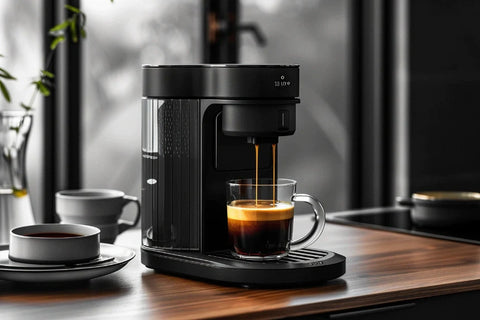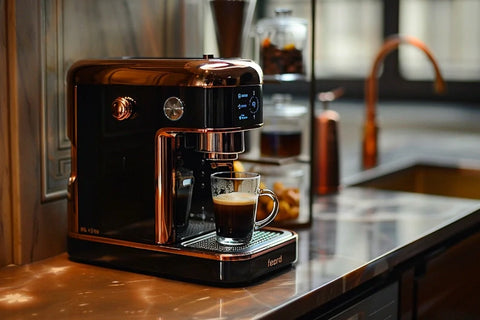When it comes to making a perfect cup of coffee, the battle between automatic and manual coffee machines has been ongoing for years. Both types have their own loyal followers, but which one is truly better? Let's delve deeper into the differences and benefits of each to find out.
Automatic and manual coffee machines are both used to make coffee, but the processes and features differ significantly. Automatic coffee machines use electric pumps to force hot water through the coffee grounds, while manual machines require the user to manually pump water through the grounds.
There are four main differences between the two types:
- Operation: Automatic machines are easier to use as they require less manual effort, while manual machines require more skill and practice to operate.
- Cost: Automatic machines are usually more expensive than manual machines.
- Customization: Manual machines offer more control over the coffee-making process, allowing for a more personalized cup of coffee.
- Maintenance: Automatic machines require more maintenance and cleaning, while manual machines are relatively easy to clean and maintain.
For home use, the choice between automatic and manual machines depends on various factors such as convenience, budget, and personal preference. If you want a quick and easy cup of coffee, an automatic machine would be better, but if you enjoy experimenting with different brewing methods and flavors, a manual machine would be a better fit.

In a commercial setting, speed and quality are crucial factors. Automatic machines can produce coffee much faster, making them suitable for high-volume businesses. However, manual machines offer more control over the brewing process, resulting in a better-tasting cup of coffee.
Automatic coffee machines have their pros and cons. Pros include convenience, speed, and consistency, while cons include higher cost and less customization options. On the other hand, manual machines have the advantage of customization and cost-effectiveness, but may require more skill and time to operate.
In conclusion, both automatic and manual coffee machines have their strengths and weaknesses. The choice between the two ultimately depends on personal preference and the specific needs of the user. Whether you prefer convenience or the art of coffee-making, both types reign supreme in their own way.
Key Takeaways:
What Are Automatic and Manual Coffee Machines?
What Are Automatic and Manual Coffee Machines?
- Automatic coffee machines: These machines handle the entire brewing process, from grinding the beans to frothing the milk, at the push of a button.
- Manual coffee machines: With these machines, the user has control over each step of the brewing process, including grinding, tamping, and steaming the milk.
What Are the Differences Between Automatic and Manual Coffee Machines?
When it comes to making the perfect cup of coffee, the debate between automatic and manual coffee machines has been ongoing. Both have their loyal followers, but what exactly sets them apart? In this section, we will delve into the key differences between automatic and manual coffee machines. From how they operate to the cost and level of customization, as well as maintenance requirements, we will give you a comprehensive understanding of the battle between these two types of coffee machines.
1. Operation
- Automatic coffee machines operate with a simple push of a button, grinding beans and extracting espresso shots effortlessly.
- Manual coffee machines require hands-on control, involving grinding, tamping, and manually pulling shots of espresso.
Fact: The operation of a coffee machine is a crucial factor that greatly impacts the overall coffee brewing experience.
2. Cost
- Initial Cost: Automatic machines generally have a higher upfront cost due to their advanced features and technology.
- Operating Cost: Manual machines tend to have lower operating costs as they require less electricity and have fewer components that may need maintenance or replacement.
- Long-term Cost: Automatic machines may have higher long-term costs due to potential repairs or replacements of complex components.
The cost of coffee machines has evolved over time, with technological advancements leading to variations in upfront, operating, and long-term costs.
3. Customization
- Adjustable Settings: Personalize your coffee experience by customizing the strength, temperature, and cup size to your liking.
- Programmable Options: Create personalized brewing schedules and unique coffee recipes.
- Milk Frothing: Achieve your desired milk-based coffee texture by selecting the froth density and temperature.
4. Maintenance
- Regularly maintain the coffee machine according to the manufacturer's guidelines.
- Descale the machine to eliminate mineral build-up and ensure top performance.
- Check and replace any worn or damaged parts to avoid malfunctions.
- Extend the lifespan of the machine by using filtered water to reduce mineral deposits.
Read: Home Espresso Machine Care 101
Which Is Better for Home Use: Automatic or Manual Coffee Machine?

When it comes to brewing the perfect cup of coffee at home, the type of coffee machine you choose can greatly impact your experience. In this section, we will discuss the two main contenders in the coffee machine battle: automatic and manual. We will delve into the key factors to consider when deciding between the two options, including convenience, budget, and personal preference. By the end, you will have a better understanding of which type of coffee machine is better suited for your home brewing needs.
1. Convenience
- Automatic coffee machines offer convenient one-touch operation, making them perfect for busy mornings.
- They provide quick and hassle-free coffee preparation, enhancing convenience for users.
- Manual machines require more effort and time, which may reduce overall convenience for users.
- However, some individuals may find the manual process enjoyable and rewarding.
2. Budget
- When making a decision between automatic and manual coffee machines, it is important to consider your budget constraints.
- While automatic machines may have a higher upfront cost, they can save money in the long run due to lower coffee wastage and consistent brewing.
- On the other hand, manual machines may have a lower initial investment, but they can result in higher operational costs over time.
3. Personal Preference
- Understand your taste: Reflect on whether you enjoy experimenting with coffee making or prefer the convenience of automated brewing.
- Evaluate control level: Consider if you prefer having precise control over every aspect of the coffee-making process or if you're content with automated settings.
- Assess time commitment: Determine if you're willing to invest time and effort into crafting your coffee or if you prioritize a quick and efficient brewing process.
Pro-tip: Your personal preference, including your desire for either automatic or manual coffee machines, should ultimately dictate your choice, ensuring a satisfying coffee experience tailored to your liking.
Which Is Better for Commercial Use: Automatic or Manual Coffee Machine?
When it comes to choosing a coffee machine for commercial use, the debate between automatic and manual options rages on. Each type has its own unique features and advantages, but which one ultimately reigns supreme? In this section, we will compare the key factors of speed, quality, and cost to determine which type of coffee machine is better suited for commercial use. From the convenience of automatic machines to the precision of manual ones, let's dive into the battle of the coffee machines.
1. Speed
- Automatic coffee machines offer faster brewing times due to their automated processes, providing quick coffee preparation for busy environments.
- Manual coffee machines, although requiring more hands-on effort, can produce a single cup of coffee at a higher speed compared to automatic machines, making them ideal for individual servings.
2. Quality
- Bean Quality: Ensure the coffee machine can handle diverse coffee bean types, from standard to specialty, while retaining their flavors.
- Brewing Process: Look for machines that prioritize a consistent extraction process, resulting in high-quality coffee with balanced flavor profiles.
- Temperature Control: Opt for machines with precise temperature controls to prevent scorching or under-extraction, ensuring optimum coffee quality.
Consider investing in a coffee machine that prioritizes bean quality, a consistent brewing process, and precise temperature control to elevate the quality of your coffee experience.
3. Cost
- Initial Cost: Manual coffee machines generally have a lower upfront cost compared to automatic machines.
- Long-term Cost: Automatic coffee machines might be more cost-effective in the long run due to reduced maintenance and higher energy efficiency.
- Consumables Cost: Consider the cost of coffee beans, filters, and other consumables specific to each type of machine.
What Are the Pros and Cons of Automatic Coffee Machines?
Automatic coffee machines have become increasingly popular in recent years, promising convenience and consistency in the brewing process. But are they truly superior to their manual counterparts? In this section, we will weigh the pros and cons of automatic coffee machines so you can decide for yourself if they are worth the investment. From saving time to sacrificing customization, we'll delve into the advantages and disadvantages of using an automatic coffee machine.
1. Pros
- Convenience: Automatic machines offer the convenience of programmable settings and one-touch functionality, making them easy to use.
- Consistency: They deliver uniform results, ensuring a reliable coffee experience every time.
- Time-saving: With automatic machines, the brewing process requires minimal supervision, saving time and effort.
2. Cons
Disadvantages of manual coffee machines include a steeper learning curve for beginners and a more hands-on approach, which may not be suitable for those seeking convenience. Additionally, manual machines require more effort and time to achieve the desired brew, making them less practical for individuals with busy schedules.
What Are the Pros and Cons of Manual Coffee Machines?

As the coffee industry continues to grow, there is a constant debate between automatic and manual coffee machines. While automatic machines offer convenience and speed, manual machines boast of a more personalized and hands-on experience. In this section, we'll take a closer look at manual coffee machines and their advantages and disadvantages. From the pros of being able to control every step of the brewing process to the cons of requiring more time and effort, we'll explore both sides of the argument and leave you to decide which reigns supreme.
Read: Are Lever Espresso Machines Worth It?
1. Pros
- Convenience: Automatic machines offer quick and easy coffee preparation at the touch of a button, catering to busy individuals.
- Consistency: Automatic machines ensure consistent brewing results, especially beneficial for commercial settings with high demand.
- Programmability: With automatic machines, users can preset brewing times and coffee strength, providing convenience and customization.
- Efficiency: Automatic machines are efficient for producing multiple cups of coffee rapidly, ideal for commercial use.
2. Cons
- Initial investment can be high.
- Require more manual effort for brewing.
- Potential for inconsistent results without proper skill and attention.
Fact: Manual coffee machines have their cons, such as the need for more manual effort and the potential for inconsistent results without proper skill and attention. However, they also allow for greater control over the brewing process, leading to a more tailored and hands-on coffee-making experience.
Frequently Asked Questions
What is the difference between an automatic and manual coffee machine?
An automatic coffee machine is designed to make coffee with minimal effort and involves pre-set volume, while a manual coffee machine allows for more control over variables such as water flow, brew time, and extraction.
What are the essential characteristics of an espresso machine?
An espresso machine typically has a high pressure brewing method, a water heater, and a tamping mechanism. These elements work together to produce a small and intense cup of coffee with a rich and bold flavor.
Read: Espresso Machines: Semi-Automatic VS Automatic VS Superautomatic
How does the brewing process of drip coffee differ from espresso?
Drip coffee is made by pouring hot water over medium-ground coffee beans and filtering it through a paper or metal filter, while espresso is made by exerting pressure to hot water through finely ground coffee beans. This results in a larger, less concentrated cup of coffee with a lower caffeine content.
What are the pros and cons of using a manual coffee machine?
Pros include control over variables, enhanced flavor profiles, artistic flair and ritual, and portability. Cons may include a steep learning curve, time-consuming process, and the need for hand strength.
What factors should be considered when choosing between an automatic and manual coffee machine?
Consider your personal taste preferences, the price range, and the level of convenience you prioritize. Automatic machines may be better for those in a rush, while manual machines are great for coffee enthusiasts who enjoy experimentation and customization.


